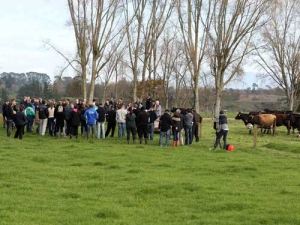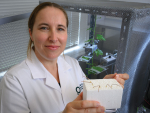About 150 people turned up to the Owl Farm Focus Day on Wednesday, June 17 for advice on finances and welfare for farmers coping in a low-payout season.
Owl Farm, in Cambridge, is a joint venture demonstration dairy farm between founding partners St Peter's School and Lincoln University.
Owl Farm demonstration manager Doug Dibley says presenters on the day, which included DairyNZ and Westpac, had consistent messages – know your position, benchmark against top not average farmers and continually pulse check actuals costs against budgeted costs.
Dibley says DairyNZ looked at the impact of the lower season payout while Westpac provided an overview on what they are seeing on the ground, and the advice, support and recommendations they are providing to help customers survive this season. It also touched briefly on the global economic climate.
Dibley himself highlighted Owl Farm's responsible cost reduction strategies, which have the goal to build a resilient system.
"I looked at the opportunities identified by Owl Farm to responsibly manage costs without compromising future productive capability," he says.
"We also talked about at the importance of better utilising what we are growing, and consistently metering pasture to ensure we can better identify surpluses and deficits to ensure we are more strategic in our use of supplementary feeds."
Season ending data was also shared, "emphasising the quick wins that we have had", he adds.
The topical issue of farmers' welfare was also touched on
Chair of the Rural Support Trust Neil Bateup stressed the importance of looking after yourself and supporting one another and told of the support available for struggling farmers.
"It's a topic which can be easily avoided but one we wanted to address up front as without healthy and happy people we don't have an industry," Dibley says.
There was a bit of time in the paddock too.
"We also had a toolbox session looking at what things we can be considering at this time of the year prior to calving starting.
"This focused firstly around animal health and what we are collectively doing at the moment to ensure stock are in the best shape for calving. We briefly discussed the importance of getting maintenance up to speed during the down period before shifting as well as looking after people and reviewing systems and structures to ensure people were well looked after and supported coming into calving."
Dibley says the Focus Day participants were very involved.
"There was great questioning, interaction and engagement from the audience and a lot of positive feedback going forward."



















